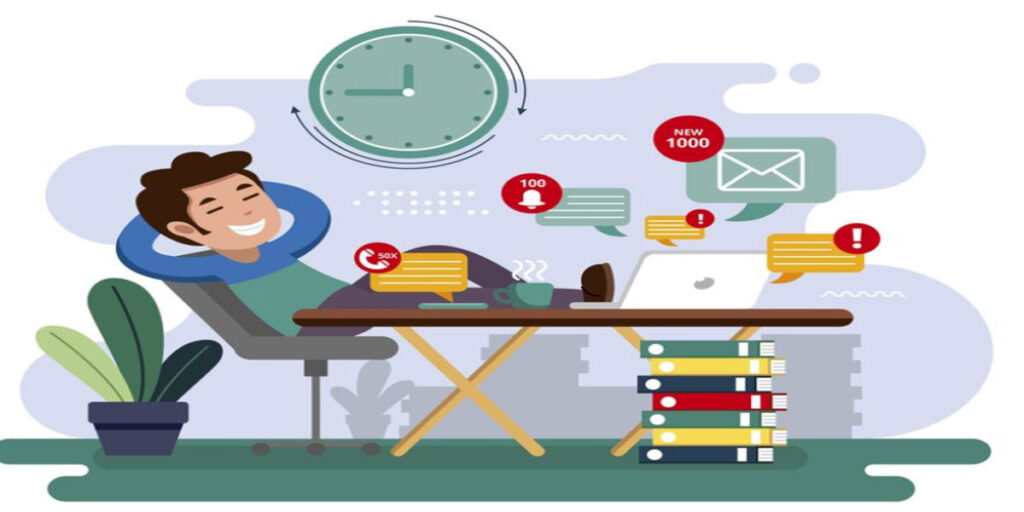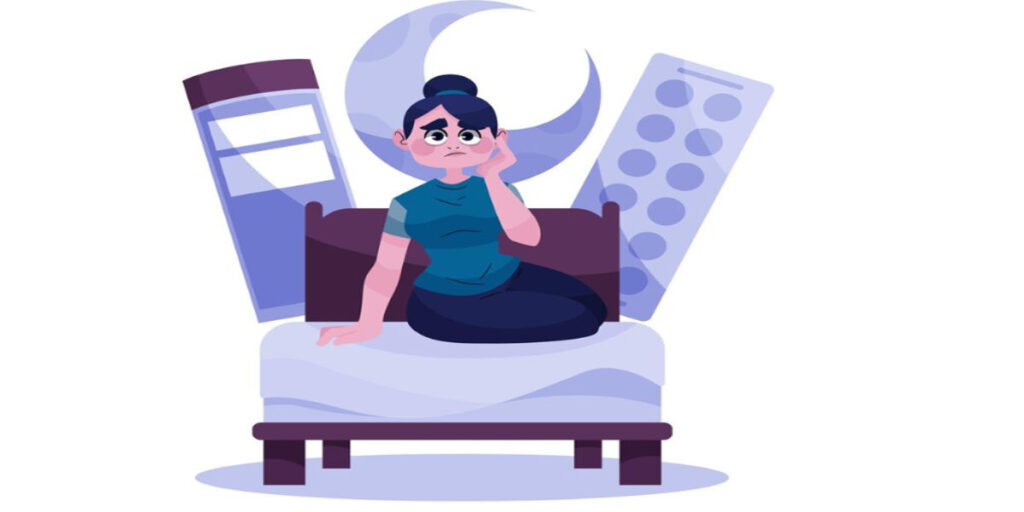In the relentless pace of present-day life, the value of an amazing night’s sleep regularly takes a backseat. However, the repercussions of neglecting our sleep wish to extend some distance beyond simple tiredness. From its effect on important frame systems to its function in fostering serious fitness issues, we explore the field of sleep science and technology and find out the diffused symptoms, causes, and roadmap to higher sleep hygiene. Brace yourself for a concise journey through the hidden repercussions of sleep loss that could just reshape your perspective on a good night’s relaxation.

Effects of Sleep Deprivation on the Body
- Overview of the Impact
Sleep deprivation, characterized by insufficient or bad-quality sleep, exacts a toll on diverse physiological structures, impairing both physical and mental well-being. The cumulative outcomes of constant sleep insufficiency can result in a cascade of health troubles.
- Central Nervous System:
Sleep deprivation profoundly affects cognitive function. Memory consolidation, choice-making, and response times are compromised, mainly due to faded alertness and increased susceptibility to accidents.
- Immune System:
Sleep plays a pivotal role in maintaining immune features. Chronic sleep deficiency weakens the immune system, making people more susceptible to infections and ailments.
- Respiratory System:
Sleep deprivation exacerbates breathing issues, especially in people with pre-existing conditions like sleep apnea. Disruptions in respiratory styles can get worse, contributing to respiratory misery.
- Digestive System:
Imbalances in sleep disrupt hormonal regulation, affecting the urge for food and metabolism. This frequently leads to overeating, weight gain, and an improved risk of situations including obesity and diabetes.
- Cardiovascular System:
Prolonged sleep deprivation elevates the risk of cardiovascular illnesses. It is associated with hypertension, abnormal coronary heart rhythms, and multiplied stress on the coronary heart, contributing to a higher chance of heart attacks and strokes.
- Endocrine System:
Sleep deprivation disrupts the delicate stability of hormones regulating pressure, growth, and metabolism. This imbalance can contribute to hormonal problems, insulin resistance, and metabolic disorders.
Conditions Aggravated via Sleep Deprivation
Sleep deprivation acts as a catalyst for the exacerbation of present health conditions. Mental fitness issues, along with tension and depression accentuate, while continual situations like diabetes and migraines turn out to be tougher to manage. Additionally, the danger of developing neurodegenerative illnesses can be heightened in the presence of continual sleep deficiency.
Understanding the intricate net of consequences that sleep deprivation weaves via these vital systems emphasizes the urgency of addressing sleep-related problems. As we unravel the unique consequences of every system, it turns obtrusive that prioritizing and improving sleep isn’t just a luxury but a need for ordinary fitness and well-being.
Causes of Sleep Deprivation

- Factors Contributing to Sleep Deprivation
Sleep deprivation can stem from different factors, starting from lifestyle alternatives to scientific conditions. Identifying these contributors is critical in devising powerful strategies to address and mitigate sleep deficiency.
- Poor Sleep Hygiene:
Irregular sleep schedules, immoderate display time earlier than bedtime, and an uncomfortable sleep environment can disrupt the herbal sleep-wake cycle, contributing to sleep deprivation.
- Stress and Anxiety:
Psychological factors, such as strain and tension, frequently bring about racing thoughts and a lack of ability to relax, stopping the onset of restful sleep.
- Work-Related Demands:
Demanding work schedules, shift paintings, and excessive-stress jobs can interfere with ordinary sleep patterns, leading to chronic sleep deprivation.
- Medical Conditions:
Underlying medical conditions, inclusive of sleep issues (e.g., insomnia, sleep apnea, restless leg syndrome), chronic pain, and neurological problems, can extensively disrupt sleep.
- Medications:
Certain medicines may additionally have aspect outcomes that interfere with sleep, both causing insomnia or drowsiness, contributing to sleep deprivation.
- Lifestyle Choices:
Unhealthy way of life conduct, inclusive of excessive caffeine or alcohol intake, lack of physical pastime, and poor weight loss program, can negatively affect sleep first-rate.
- Technology Overuse:
The pervasive use of electronic devices, specifically before bedtime, can disrupt the production of melatonin, the hormone liable for regulating sleep-wake cycles.
- Environmental Factors:
Noise, light pollutants, and uncomfortable temperatures in the sleep environment can create barriers to achieving a restful night’s sleep.
Identifying the precise factors contributing to sleep deprivation is the first step in the direction of growing personalized interventions. Whether through lifestyle adjustments, pressure control strategies, or scientific interventions, addressing the root reasons is vital for restoring healthful sleep patterns. As we get to the bottom of the numerous elements that lead to sleep deficiency, the path to effective prevention and control will become clearer.
Symptoms and Causes
- Recognizing Symptoms of Sleep Deprivation
Stages of Sleep Deprivation:
- Initial Stage:
Fatigue and irritability set in, affecting mood and universal alertness.
Intermediate Stage: Cognitive capabilities decline, leading to reminiscence lapses, issue concentrating, and impaired selection-making.
- Advanced Stage:
Physical and intellectual fitness deteriorate similarly, resulting in hallucinations, accelerated susceptibility to illness, and heightened emotional responses.
Identifying Causes, including Mental Health Concerns
Mental Health Concerns:

- Anxiety and Depression:
Sleep deprivation is carefully linked to the exacerbation of hysteria and depression signs, developing a cyclical courting between intellectual fitness and sleep quality.
- Insomnia:
Persistent trouble falling or staying asleep is an unusual contributor to sleep deprivation.
- Stress:
Elevated pressure levels can prevent the ability to unwind and achieve restful sleep.
Is it contagious?
Contrary to some misconceptions, sleep deprivation itself isn’t contagious. However, its effects on behavior, mood, and cognitive function can affect relationships and have an impact on the sleep patterns of those nearby.
Understanding the symptoms and reasons for sleep deprivation is pivotal in spotting the circumstance and taking proactive measures to address it. The stages offer insight into the development of sleep deficiency, from preliminary signs to greater, excessive effects. Additionally, recognizing the interplay between sleep and mental fitness highlights the significance of a holistic approach to properly being. As we delve deeper into the nuanced causes, it becomes evident that complete information on both the signs and underlying factors is important for powerful prevention and control of sleep deprivation.
Diagnosis and Tests
Methods for Diagnosing Sleep Deprivation
- Clinical Evaluation:
Healthcare specialists may additionally conduct a comprehensive clinical assessment, considering clinical records, sleep patterns, and way of life elements to become aware of potential causes of sleep deprivation.
- Sleep Diary:
Keeping a sleep diary, and documenting bedtime workouts, sleep duration, and daylight hours signs, can offer treasured facts for healthcare providers.
- Actigraphy:
Wearable devices referred to as actigraphs can tune motion and mild publicity, imparting goal facts on sleep patterns and ability disruptions.
Polysomnography:
In a few cases, polysomnography, a sleep study conducted in managed surroundings, may be endorsed to screen diverse physiological parameters in the course of sleep.
Management and Treatment

Cognitive Behavioral Therapy for Insomnia (CBT-I):
CBT-I is a structured program that addresses the mind, behaviors, and attitudes associated with sleep, assisting people develop more healthy sleep behavior.
- Medications:
Depending on the underlying causes, healthcare vendors may prescribe medications that include sleep aids, antidepressants, or medicinal drugs focused on precise sleep problems.
- Lifestyle Modifications:
Implementing wholesome sleep hygiene practices, consisting of retaining a constant sleep timetable, growing a snug sleep environment, and limiting stimulants, can extensively improve sleep.
- Stress Management Techniques:
Learning and applying stress control strategies, consisting of meditation, deep respiratory sporting events, or modern muscle rest, can alleviate factors contributing to sleep deprivation.
Possible Complications/Side Effects of Treatment
- Medication Side Effects:
Some medicines might also have side outcomes, along with drowsiness, dependency, or interactions with different tablets.
- Behavioral Changes:
Implementing behavioral modifications might also require time and consistency, and people may also experience resistance or challenges in adopting new habits.
Self-Care Strategies for Managing Symptoms
- Establishing a Routine:
Creating a regular bedtime recurring indicators the frame that it is time to wind down, selling better sleep.
- Limiting Stimulants:
Avoiding caffeine, nicotine, and electronic gadgets before bedtime facilitates minimizing elements that disrupt sleep.
Timeline for Improvement After Treatment

- Varied Timelines:
The timeline for improvement varies based totally on personal factors, the severity of sleep deprivation, and the chosen remedy technique.
- Consistency is Key:
Adhering to prescribed treatments and maintaining wholesome sleep conduct consistently enhances the chance of sustained development over time.
Understanding the diagnostic techniques and remedy options for sleep deprivation empowers individuals to are looking for suitable assistance. Whether via clinical evaluation, behavioral interventions, or remedy, addressing sleep deficiency involves a tailored approach. Additionally, recognizing ability headaches and adopting self-care techniques, in addition, supports the journey towards progressed sleep fitness. As we explore the avenues for prognosis and management, it becomes evident that a comprehensive and personalized strategy is crucial for effectively tackling sleep deprivation.
Management and Treatment
- Treatment Approaches
Cognitive Behavioral Therapy for Insomnia (CBT-I):
Cognitive Behavioral Therapy for Insomnia is an evidence-based approach aimed at identifying and converting thoughts and behaviors that contribute to sleep problems. It addresses elements along with sleep hygiene, relaxation techniques, and reshaping terrible mind approximately sleep.
Medications:
Depending on the underlying reasons for sleep deprivation, healthcare vendors may additionally prescribe medications. These can encompass over-the-counter sleep aids, sedatives, or medicines mainly targeting sleep problems like insomnia or sleep apnea.
Lifestyle Modifications:
Implementing healthful sleep hygiene practices is fundamental. This consists of preserving a consistent sleep agenda, developing a snug sleep environment (cool, darkish, and quiet), and proscribing stimulants together with caffeine and electronics before bedtime.
Stress Management Techniques:

Learning and practicing strain control strategies, which include mindfulness meditation, deep breathing exercises, or modern muscle rest, can assist in alleviating stressors that contribute to sleep deprivation.
Possible Complications/Side Effects of Treatment
- Medication Side Effects:
Some medicines may additionally have side consequences such as drowsiness, dependency, or interactions with other drugs. It’s vital to talk about ability aspect effects with healthcare providers.
- Behavioral Changes:
Adopting new behavioral habits may be challenging. Resistance or setbacks can also arise, and it’s crucial to address those problems with healthcare companies to ensure successful treatment.
Self-Care Strategies for Managing Symptoms
- Establishing a Routine:
Creating a regular bedtime routine signals the frame that it is time to wind down. This can also encompass sports which include studying, taking a heat tub, or training relaxation exercises.
- Limiting Stimulants:
Avoiding stimulants like caffeine and nicotine near bedtime facilitates limiting elements that can disrupt sleep.
- Screen Time Reduction:
Limiting display screen time before mattress, because the blue mild emitted by digital gadgets can intervene with the production of melatonin, a hormone that regulates sleep-wake cycles.
- Regular Physical Activity:
Engaging in everyday bodily activity can sell higher sleep. However, it is advisable to keep away from full-of-life exercising close to bedtime.
Timeline for Improvement After Treatment
- Varied Timelines:
The timeline for development varies primarily based on man or woman elements, the severity of sleep deprivation, and the chosen remedy approach. Some people may additionally revel in high-quality modifications relatively quickly, whilst others may additionally require extra time.
- Consistency is Key:
Consistently following prescribed treatments and preserving healthful sleep conduct are essential for sustained improvement. Long-time period fulfillment often is predicated on the dedication to wonderful lifestyle adjustments.
Navigating the diverse remedy alternatives for sleep deprivation calls for a comprehensive understanding of the available strategies. Whether through healing interventions, medicines, or way of life changes, a tailor-made strategy can extensively improve sleep high-quality. Recognizing potential complications and adopting self-care techniques in addition supports the journey toward better sleep health. As we discover the avenues for control and treatment, it becomes evident that a holistic and individualized technique is important for efficaciously addressing sleep deprivation.
Sleep Foundation Score™
- Introduction to Sleep Foundation Score™
Assessing Sleep Health:
The Sleep Foundation Score™ serves as a precious tool for individuals to evaluate and understand their sleep health. It takes into consideration different factors influencing sleep and gives a customized assessment.
- Holistic Approach:
By thinking about more than one dimensions of sleep, which include length, pleasantness, and consistency, the Sleep Foundation Score™ gives a holistic perspective on a character’s sleep patterns.
- Benefits of a Better Sleep Foundation
A better Sleep Foundation Score™ correlates with better average health. Prioritizing sleep undoubtedly impacts bodily health, intellectual well-being, and cognitive characteristics.
- Enhanced Daytime Performance:
Individuals with an ultimate Sleep Foundation Score™ often revel in expanded alertness, improved concentration, and higher decision-making throughout the day.
Reduced Health Risks:
A strong correlation exists between an excellent Sleep Foundation Score™ and a decreased hazard of diverse fitness issues, which include cardiovascular illnesses, metabolic issues, and mental fitness conditions.
Offering Personalized Sleep Profiles
Tailored Recommendations:
The Sleep Foundation Score™ does not simply offer an evaluation; it offers personalized tips to cope with unique regions of challenge. This may additionally encompass guidelines for sleep hygiene, lifestyle adjustments, or similar assessments for capability sleep disorders.
- Tracking Progress:
Regularly assessing the Sleep Foundation Score™ allows people to tune their development in optimizing sleep habits. This tracking fosters a sense of responsibility and motivation for preserving healthy sleep practices.
The Sleep Foundation Score™ serves as a treasured best friend in the pursuit of top-of-the-line sleep health. Its comprehensive evaluation and personalized guidelines empower people to take proactive steps toward improving their sleep foundation. As we discover the significance of this device, it will become clear that information and improving one’s Sleep Foundation Score™ is a key issue of attaining and maintaining universal well-being.
Conclusion
In the end, the profound effect of sleep deprivation on the human frame can’t be overstated. From the complicated web, that weaves through important physiological structures to the diffused manifestations in each day’s existence, recognizing the outcomes is step one closer to transformative trade. By knowing the causes, signs, and to-be-had treatments, individuals can embark on an adventure toward advanced sleep fitness.
The Sleep Foundation ScoreTM provides a treasured assessment tool, guiding people to make informed selections and customized changes for better sleep. As we navigate through the various facets of sleep deprivation, it will become obvious that prioritizing sleep isn’t always just a luxurious but essential funding for standard well-being. In fostering a culture that values and prioritizes adequate, fine sleep, we pave the way for more healthy, more satisfying lives.


